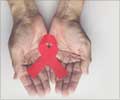A new approach using the body's ability to fight HIV without antiretroviral drugs has shown some success in nearly half the patients enrolled in a small study.

The treatment kept HIV under control in nine of the 20 patients at the 12-week mark, and appeared to decrease the amount of HIV present in cells that harbor the infection, known as reservoirs.
The trial was meant to last 24 weeks or until a person's HIV levels either rose or T-cells dropped to a certain level, at which point the subjects were to resume their antiretroviral treatment.
Just eight people stayed in the study for its full 24-week duration.
However, researcher Luis Montaner, a professor at the Wistar Institute and director of its HIV-1 Immunopathogenesis Laboratory, was optimistic that the findings had broken new ground.
"Our data shows that our human immune response can be made to control HIV in persons who have otherwise lost that ability and, if sustained by natural interferon production, it establishes proof-of-concept that a functional cure is theoretically possible," Montaner said in a statement.
Advertisement
The research, which has not been published or independently peer-reviewed, was presented at the 2012 Conference on Retroviruses and Opportunistic Infections in Seattle, Washington.
Advertisement















